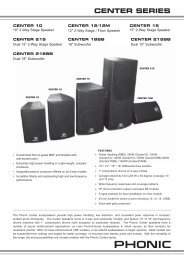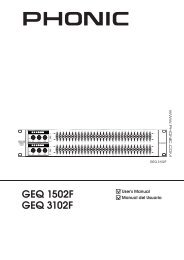Powerpod 620 Powerpod 740 Powerpod 780 Powerpod 1062
Powerpod 620 Powerpod 740 Powerpod 780 Powerpod 1062
Powerpod 620 Powerpod 740 Powerpod 780 Powerpod 1062
You also want an ePaper? Increase the reach of your titles
YUMPU automatically turns print PDFs into web optimized ePapers that Google loves.
BASIC SETUP<br />
Getting Started<br />
1. Turn all power off on the <strong>Powerpod</strong> Mixer. To ensure this, the<br />
AC cable should not be connected to the unit.<br />
2. All faders and level controls should be set at the lowest level<br />
to ensure no sound is inadvertently sent through the outputs<br />
when the device is switched on. All levels should be altered to<br />
acceptable degrees after the device is turned on.<br />
3. Plug all necessary instruments and equipment into the device's<br />
various inputs as required. This may include line signal devices,<br />
as well as microphones and/or guitars, keyboards, etc.<br />
4. Plug any necessary equipment into the device's various outputs.<br />
This could include speakers, monitors, signal processors, and/<br />
or recording devices.<br />
NB. No devices other than speakers should be connected to the power amp<br />
outputs. Plugging inappropriate devices into the mixer will likely cause<br />
damage to the device. Also, guitar cables should not be used to connect<br />
amplifiers to speakers.<br />
5. Plug the supplied AC cable into the AC inlet on the back of the<br />
device, ensuring local voltage level is identical to that selected<br />
by the Voltage Selector on the rear of your device.<br />
6. Plug the supplied AC cable into a power outlet of a suitable<br />
voltage.<br />
7. Turn the power switch on.<br />
Channel Setup<br />
1. To ensure the correct audio levels of each input channel is<br />
selected, every channel faders should first be set to 0.<br />
2. Choose the channel that you wish to set the level of, and ensure<br />
that channel has a signal sent to it similar to the signal that will<br />
be sent when in common use. For example, if the channel is<br />
using a microphone, then you should speak or sing at the same<br />
level the performer normally would during a performance. If a<br />
guitar is plugged into that channel, then the guitar should also<br />
be used as it normally would be.<br />
NB. It is probably best to have nothing plugged into channels which are<br />
not being set, just to ensure no signal is inadvertently sent through the<br />
channel.<br />
3. This channel is now ready to be used; you can stop making the<br />
audio signal.<br />
4. You should now select the next channel to set and go back to<br />
follow steps 1 through 3.<br />
MAKING CONNECTIONS<br />
Channel Inputs<br />
The <strong>Powerpod</strong> <strong>620</strong>, <strong>740</strong> and <strong>1062</strong> Plus Mixers supply various<br />
numbers input channels. The <strong>620</strong> Plus features a total of 6<br />
channels, 2 of which accept stereo signals. The <strong>740</strong> and <strong>780</strong><br />
Plus, on the other hand, features a total of 7 input channels, 3 of<br />
which accept stereo signals. The <strong>Powerpod</strong> <strong>1062</strong> Plus features a<br />
total on 10 input channels, including 3 which feature stereo inputs.<br />
Each channel features a microphone XLR jack and at least one<br />
1/4” Phone Jack for balanced and unbalanced connections. Each<br />
stereo channel features different inputs jacks, accepting either<br />
microphone inputs or stereo line inputs.<br />
1. XLR Lo-Z Inputs<br />
These XLR microphone inputs can be used in conjunction with<br />
a wide range of microphones, such as professional condenser,<br />
dynamic or ribbon microphones, with standard XLR male<br />
connectors. With low noise preamplifiers, these inputs serve for<br />
crystal clear sound replication.<br />
NB. When using an unbalanced microphone, please ensure phantom power<br />
is switched off. However, when using condenser microphones the phantom<br />
power should be activated.<br />
2. 1/4" Hi-Z and Super Hi-Z Input Jacks<br />
These inputs accept typical 1/4” TRS or TS unbalanced inputs. The<br />
Hi-Z inputs accept balanced TRS inputs, and are for Microphone<br />
to line-level device (such as synthesizers and drum machines),<br />
where the Super Hi-Z inputs accept TS unbalanced sources, and<br />
can be used in conjunction with devices with higher impedance<br />
levels (including electric guitars and basses).<br />
NB.When using a line-level device on your mixer, the PAD -25 button should<br />
be initiated.<br />
3. Stereo Channel Inputs<br />
Each of the <strong>Powerpod</strong> <strong>740</strong>, <strong>780</strong> and <strong>1062</strong> Plus Powered Mixers<br />
provide 3 stereo input channels (the <strong>Powerpod</strong> <strong>620</strong> Plus has 2),<br />
the inputs of which differ slightly to the mono channels. The 3-pin<br />
XLR inputs featured are for the addition of microphones with typical<br />
XLR male inputs, where the 2 Line 1/4" TS jacks are for the addition<br />
of various stereo line level input devices, such as keyboards. If you<br />
wish to use a monaural device on a stereo return input, simply plug<br />
the device’s 1/4" phone jack into the left (mono) stereo input and<br />
leave the right input bare. The signal will be duplicated to the right<br />
due to the miracle of jack normalizing.<br />
2 3<br />
1<br />
POWERPOD <strong>620</strong> / <strong>740</strong> / <strong>780</strong> / <strong>1062</strong>













